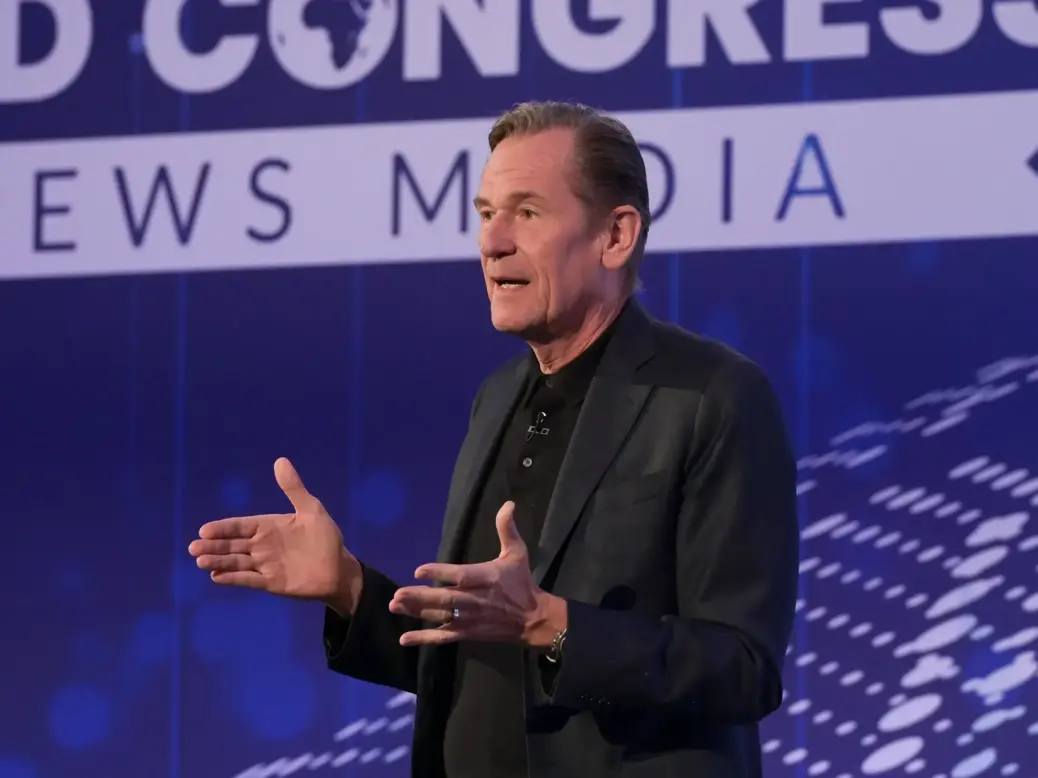
Axel Springer chief executive Mathias Dopfner has explained why he signed a deal with OpenAI as he admitted that large language models could “completely destroy the media as we know it”.
Speaking at the INMA World News Media Congress in London (where Press Gazette was a media partner), the boss of newsbrands including Bild, Politico and Business Insider was asked by one delegate why he had “made a pact with the devil” and what he made of the New York Times lawsuit against OpenAI.
Dopfner said: “It is okay to do both in parallel and the two ways could contribute to a good outcome.
“Our deal is not that much driven by data delivery for training purposes because that might be a short-term gain. The most important part of our deal is the content delivery of stories we create and remuneration for that, because that is always based on new and original content.”
Dopfner said he had fought for 15 years to secure EU copyright reform in 2019, paving the way for publisher payments for content from Google in some jurisdictions.
He said: “We were all happy and proud then suddenly a rocket came out of orbit called LLM and everything we had done in the last 20 years was at least at risk, if not useless.”
Dopfner said this motivated him to approach OpenAI chief executive Sam Altman seeking a deal, securing one within two months in December 2023.
He said: “After fighting 15 years for copyright reform in the EU and then not having a collective negotiation power to the platforms in order to benefit from that solution and because of total disruption through the arrival of large language models, I thought this time it is smarter to establish the principle as a matter of fact through a deal rather than going through another three or five-year process of lawsuits and regulatory discussion.”
Dopfner added: “It is very encouraging that this time it seems the players understand the necessity that they also have to contribute to help the ecosystems. This time I am a bit more optimistic than I used to be.”
Mathias Dopfner: LLMs could ‘completely destroy media as we know it’ or herald a new start
He described the public release of ChatGPT in November 2022 as a watershed moment akin to seeing the first newspaper website in 1995 and the first smartphone in 2007.
He said: “When I used ChatGPT for the first time and got a stunningly good answer I realised this generation of new answering machines has the potential to either completely destroy media as we know it or to…bring a new beginning. It depends on us how this is going to develop.”
He warned that LLMs could circumvent media altogether by quickly providing users with the answers they want in the language they prefer. And he warned against complacency, saying the strengths of LLMs far outweigh the well-publicised weaknesses.
He said: “If we embrace the possibilities of LLMs we can not only make our work much easier, cheaper and efficient, but also better and more impactful.”
And he urged publishers to use the productivity savings brought by use of generative AI to invest in future-proofing their businesses.
He said: “We need to rediscover the origins of journalism which was based on news, to find out something that was not supposed to be found out. Every real journalist is driven by that, not wanting to aggregate information that is out there anyway.
“Reporting, coming up with something new, unknown, is the essence of the business.”
However Dopfner said we also need a new “legal framework that makes sure intellectual property is protected”.
He said: “It will not be protected by copyright as we know it. If we don’t achieve it collectively, we will be lost. If we stick together we have a real opportunity.”
He added that he thinks politicians sense the urgency of the need for new regulation because “bots have the potential to undermine all democratic institutions”.
Email pged@pressgazette.co.uk to point out mistakes, provide story tips or send in a letter for publication on our "Letters Page" blog
